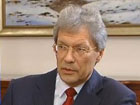| Videos | ? Latest |
|
? Feature | ? Sports | ? Your Videos |
Diplomats focus on five-year outline

Observers say the annual plenary sessions of the National People's Congress represent an unparalleled occasion to feel the new pulses of China's development, from an all-around perspective. Let's find out what the most pressing issues are, for some of the ambassadors and delegates attending the session.
Sergei Razov, Russian Ambassador to China, said, "The NPC and CPPCC have played an increasingly important role in the Chinese political system. However, as a country with 1.3 billion people, China still faces grave challenges. I would like to see how the Chinese government plans to tackle imbalance regional development, the widening gap between rich and poor, the soaring property prices and the realization of the RMB as the fully convertible currency."
Alain Nicaise Papatchi Coffie, Cote D'ivoire Ambassador to China, said, "We regard China as a model to follow, an example to look up to. Cote d'Ivoire wants to draw inspiration from this model to restore its prestigious image, and to enable us to follow the path to development."
Paul Chong Leung, Mauritian Ambassador to China, said, "China has always had a very big economy in Mauritius, and I can tell you that the Chinese new year is a public holiday in our country. The first Chinese cultural center was established in 1985. Chinese people are welcome in Mauritius, they are hard-workers, smart and easily adaptable with the local population."
Harold Forsyth, Peruvian Ambassador to China, said, "We are interested in the economic development of China, as we know, China became the world's second largest economy earlier this year. We would like to see how issues like the RMB exchange rate will be dealt with in the meetings."
Gafar, Chinese Affairs Expert from Sudan, said, "From my own observation, no party could help hundreds of millions of people walk out of poverty as the Communist Party has, and in only two decades' time China has become the world's second largest economy. It's a miracle. However we also see that China's has paid a price, mostly keenly felt in the country's natural environment. We would like to see how Premier Wen Jiabao responds to environmental degradation in his work report and how China could develop more sustainable."
"The increasing international attention to the Beijing sessions reflected the rise of China's influence in the world. In the meantime, by keeping close watch on these sessions, the world could gain more insights into the prospects of China's development in the years to come. Zhang Nini, CCTV, Beijing."
 0
0 






